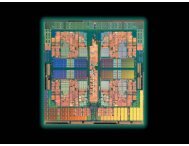enddo - The Portland Group
enddo - The Portland Group
enddo - The Portland Group
Create successful ePaper yourself
Turn your PDF publications into a flip-book with our unique Google optimized e-Paper software.
Performance Optimization<br />
on GPUs<br />
Michael Wolfe<br />
Michael.Wolfe@pgroup.com<br />
http://www.pgroup.com<br />
November 2011<br />
2-1
AMD “Magny-Cours”
Host Architecture Features<br />
Register files (how many? what kind?)<br />
Functional units (how many?), cache (I, D)<br />
Execution pipeline (pipeline stages?)<br />
• branch prediction, hazards (types?)<br />
• pipelined functional units, superpipelining, register bypass<br />
• stalls, avoiding stalls<br />
Multiscalar execution (superscalar, control unit lookahead)<br />
• LIW (long instruction word)<br />
Multithreading, Simultaneous multithreading<br />
Vector instruction set<br />
Multiprocessor, Multicore, coherent caches (MESI protocols)<br />
1-3
Making It Faster<br />
Processor:<br />
• ________<br />
• ________<br />
Memory<br />
• Latency<br />
• Bandwidth<br />
1-4
Abstracted x64+Tesla Architecture<br />
1-5
Abstracted x64+Fermi Architecture<br />
1-6
GPU Architecture Features<br />
Optimized for high degree of regular parallelism<br />
Classically optimized for low precision<br />
• Fermi supports double precision at ½ single precision bandwidth<br />
High bandwidth memory (Fermi supports ECC)<br />
Highly multithreaded (slack parallelism)<br />
Hardware thread scheduling<br />
Non-coherent software-managed data caches<br />
• Fermi has two-level hardware data cache<br />
No multiprocessor memory model guarantees<br />
• some guarantees with fence operations<br />
1-7
Tesla-10 Features Summary<br />
Massively parallel thread processors<br />
• Organized into multiprocessors<br />
• up to 30, see deviceQuery or pgaccelinfo<br />
• Physically: 8 thread processors per multiprocessor<br />
• ISA: 32 threads per warp<br />
• Logically: Thread block is quasi-SIMD<br />
Memory hierarchy<br />
• host memory, device memory, constant memory, shared memory,<br />
register<br />
Queue of operations (kernels) on device<br />
1-8
Fermi (Tesla-20) Features Summary<br />
Massively parallel thread processors<br />
• Organized into multiprocessors<br />
• up to 16, see deviceQuery or pgaccelinfo<br />
• Physically: two groups of 16 thread processors per multiprocessor<br />
• ISA: still 32 threads per warp, dual issue for 32-bit code<br />
Memory hierarchy<br />
• host memory, device memory (two level hardware cache), constant<br />
memory, (configurable) shared memory, register<br />
Queue of operations (kernels) on device<br />
ECC memory protection (supported, not default)<br />
Much improved double precision performance<br />
Hardware 32-bit integer multiply<br />
1-9
Parallel Programming on CPUs<br />
Instruction level parallelism (ILP)<br />
• Loop unrolling, instruction scheduling<br />
Vector parallelism<br />
• Vectorized loops (or vector intrinsics)<br />
Thread level / Multiprocessor / multicore parallelism<br />
• Parallel loops, parallel tasks<br />
• Posix threads, OpenMP, Cilk, TBB, .....<br />
Large scale cluster / multicomputer parallelism<br />
• MPI (& HPF, co-array Fortran, UPC, Titanium, X10, Fortress,<br />
Chapel)<br />
1-10
Parallel Programming on GPUs<br />
Instruction level parallelism (ILP)<br />
• Loop unrolling, instruction scheduling<br />
Vector parallelism<br />
• CUDA Thread Blocks, OpenCL Work <strong>Group</strong>s<br />
Thread level / Multiprocessor / multicore parallelism<br />
• CUDA Grid, OpenCL<br />
1-11
Performance Tuning<br />
Performance Measurement<br />
Choose an appropriately parallel algorithm, appropriate data structure<br />
Optimize data movement between host and GPU<br />
• frequency, volume, regularity<br />
Optimize device memory accesses<br />
• strides, alignment<br />
• use shared memory<br />
• use constant memory, texture memory<br />
Optimize kernel code<br />
• redundant code elimination<br />
• loop unrolling<br />
• Optimize compute intensity<br />
• unroll the parallel loop<br />
2-12
Host-GPU Data Movement<br />
Avoid altogether<br />
Move outside of loops<br />
Better to move a whole array than subarray<br />
Update halo regions rather than whole array<br />
• use GPU to move halo region to contiguous area?<br />
Use streams, overlap data / compute<br />
• requires pinned host memory<br />
2-13
Occupancy<br />
How many simultaneously active warps / maximum<br />
(maximum is 24, 32 (Tesla-10), 48 (Fermi))<br />
Limits<br />
• threads per multiprocessor<br />
• threads per thread block (512 / 1024)<br />
• thread blocks per multiprocessor (8)<br />
• register usage (8K / 16K / 32K registers / multiprocessor)<br />
• each warp uses 32n, so 16Kreg = 512wreg<br />
• shared memory usage (16KB / 48KB)<br />
Low occupancy often leads to low performance<br />
High occupancy does not guarantee high performance<br />
2-14
Execution Configuration<br />
Execution configuration affects occupancy<br />
Want many threads per thread block<br />
• multiple of 32<br />
• 64, 128, 192, 256<br />
Want many many thread blocks<br />
2-15
Divergence<br />
Scalar threads executing in SIMD mode<br />
• if( threadidx%x
Divergence<br />
Pad arrays to multiples of block size<br />
• i = (blockidx%x-1)*64 + threadidx%x<br />
if( i
Global Memory<br />
Stride-1, aligned accesses<br />
• address is aligned to mod(threadidx%x,16)<br />
• threadidx%x and threadidx%x+1 access consecutive addresses<br />
• alignment critical for Compute Capability 1.0, 1.1<br />
Using shared memory as data cache<br />
• Redundant data access within a thread<br />
• Redundant data access across threads<br />
• Stride-1 data access within a thread<br />
2-18
Redundant access within a<br />
GPU Thread<br />
! threadidx%x from 1:64<br />
! this thread block does 256 ‘i’ iterations<br />
ilo = (blockidx%x-1)*256<br />
ihi = blockidx*256 - 1<br />
...<br />
do j = jlo, jhi<br />
do i = ilo+threadidx%x, ihi, 64<br />
A(i,j) = A(i,j) * B(i)<br />
<strong>enddo</strong><br />
<strong>enddo</strong><br />
2-19
Redundant access within a<br />
GPU Thread<br />
real,shared :: BB(256)<br />
...<br />
do ii = 0, 255, 64<br />
BB(threadidx%x+ii) = B(ilo+ii)<br />
<strong>enddo</strong><br />
call syncthreads()<br />
do j = jlo, jhi<br />
do i = ilo+threadidx%x, ihi, 64<br />
A(i,j) = A(i,j) * BB(i-ilo)<br />
<strong>enddo</strong><br />
<strong>enddo</strong><br />
2-20
Redundant access across<br />
GPU Threads<br />
! threadidx%x from 1:64<br />
i = (blockidx%x-1)*64 + threadidx%x<br />
...<br />
do j = jlo, jhi<br />
A(i,j) = A(i,j) * B(j)<br />
<strong>enddo</strong><br />
2-21
Redundant access across<br />
GPU Threads<br />
real, shared :: BB(64)<br />
i = (blockidx%x-1)*64 + threadidx%x<br />
...<br />
do jb = jlo, jhi, 64<br />
BB(threadidx%x) = B(jb+threadidx%x)<br />
call syncthreads()<br />
do j = jb, min(jhi,jb+63)<br />
A(i,j) = A(i,j) * BB(j-jb+1)<br />
<strong>enddo</strong><br />
call syncthreads()<br />
<strong>enddo</strong><br />
2-22
Stride-1 Access within a GPU thread<br />
! threadidx%x from 1:32<br />
i = (blockidx%x-1)*32 + threadidx%x<br />
...<br />
ix = indx(i)<br />
do j = jlo, jhi<br />
A(i,j) = A(i,j) * B(ix+j)<br />
<strong>enddo</strong><br />
2-23
Stride-1 Access within a GPU thread<br />
real, shared :: BB(32,32)<br />
integer, shared :: IXX(32)<br />
i = (blockidx%x-1)*32 + threadidx%x<br />
...<br />
ix = indx(i)<br />
IXX(threadidx%x) = ix<br />
call syncthreads()<br />
do jb = jlo, jhi, 32<br />
do j = 1, 32<br />
BB(threadidx%x,j) = B(IXX(j)+threadidx%x)<br />
<strong>enddo</strong><br />
do j = jb, min(jhi,jb+31)<br />
A(i,j) = A(i,j) * BB(j,threadidx%x)<br />
<strong>enddo</strong><br />
<strong>enddo</strong><br />
2-24
Stride-1 Access within a GPU thread<br />
real, shared :: BB(33,32)<br />
integer, shared :: IXX(32)<br />
i = (blockidx%x-1)*32 + threadidx%x<br />
...<br />
ix = indx(i)<br />
IXX(threadidx%x) = ix<br />
call syncthreads()<br />
do jb = jlo, jhi, 32<br />
do j = 1, 32<br />
BB(threadidx%x,j) = B(IXX(j)+threadidx%x)<br />
<strong>enddo</strong><br />
do j = jb, min(jhi,jb+31)<br />
A(i,j) = A(i,j) * BB(j,threadidx%x)<br />
<strong>enddo</strong><br />
<strong>enddo</strong><br />
2-25
Shared Memory<br />
16 memory banks<br />
Use threadidx%x in leading (stride-1) dimension<br />
Avoid stride of 16<br />
Shared memory also used to pass kernel arguments, affects<br />
occupancy<br />
2-26
Unroll the Parallel Loop<br />
If thread „j‟ and „j+1‟ share data, where<br />
• j is a parallel index<br />
• j is not the stride-1 index<br />
Unroll two or more iterations of „j‟ into the kernel<br />
2-27
Low-level Optimizations<br />
instruction count optimizations<br />
• loop unrolling (watch memory access patterns)<br />
• loop fusion<br />
minimize global memory accesses<br />
• use scalar temps<br />
• scalarizing arrays<br />
• downsides:<br />
increased register usage<br />
spills to “local memory”<br />
use shared memory for threadIdx-invariant values<br />
• nvcc –Xptxas=-v<br />
• pgfortran –Mcuda=ptxinfo<br />
2-28
Other Hacks<br />
Low precision transcendental functions (__sinf, ...)<br />
• Compiler Option?<br />
24-bit integer multiply (Tesla only)<br />
• Compiler Option?<br />
atomic operations<br />
warp-vote functions, warp-level programming<br />
2-29
SAXPY on Host<br />
subroutine saxpy (A,X,Y,N)<br />
real(4) :: A, X(N), Y(N)<br />
integer :: N, i<br />
do i = 1,N<br />
X(i) = A * X(i) + Y(i)<br />
<strong>enddo</strong><br />
end subroutine<br />
void saxpy( float a, float* x, float* y, int n ){<br />
int i;<br />
for( i = 0; i < n; ++i ){<br />
x[i] = a*x[i] + y[i];<br />
}<br />
}<br />
2-30
CUDA C SAXPY Device Code<br />
__global__ void<br />
saxpy_kernel( float a, float* x, float* y, int n ){<br />
int i;<br />
i = blockIdx.x*blockDim.x + threadIdx.x;<br />
if( i
CUDA Fortran SAXPY Device Code<br />
module kmod<br />
use cudafor<br />
contains<br />
attributes(global) subroutine saxpy_kernel(A,X,Y,N)<br />
real(4), device :: A, X(N), Y(N)<br />
integer, value :: N<br />
integer :: i<br />
i = (blockidx%x-1)*blockdim%x + threadidx%x<br />
if( i
CUDA C SAXPY Host Code<br />
void saxpy( float a, float* x, float* y, int n ){<br />
float *xd, *yd;<br />
cudaMalloc( (void**)&xd, n*sizeof(float) );<br />
cudaMalloc( (void**)&yd, n*sizeof(float) );<br />
cudaMemcpy( xd, x, n*sizeof(float),<br />
cudaMemcpyHostToDevice );<br />
cudaMemcpy( yd, y, n*sizeof(float),<br />
cudaMemcpyHostToDevice );<br />
saxpy_kernel>( a, xd, yd, n );<br />
cudaMemcpy( x, xd, n*sizeof(float),<br />
cudaMemcpyDeviceToHost );<br />
cudaFree( xd ); cudaFree( yd );<br />
}<br />
2-33
CUDA Fortran SAXPY Host Code<br />
subroutine saxpy( A, X, Y, N )<br />
use kmod<br />
real(4) :: A, X(N), Y(N)<br />
integer :: N<br />
real(4), device, allocatable, dimension(:):: &<br />
Xd, Yd<br />
allocate( Xd(N), Yd(N) )<br />
Xd = X(1:N)<br />
Yd = Y(1:N)<br />
call saxpy_kernel(A, Xd, Yd, N)<br />
X(1:N) = Xd<br />
deallocate( Xd, Yd )<br />
end subroutine<br />
2-34
Measuring Performance<br />
event timer<br />
profiler<br />
trace<br />
2-35
event timers<br />
cudaEvent_t e1, e2;<br />
float usec;<br />
cudaEventRecord( e1, 0 );<br />
saxpy_kernel>( a, xd, yd, n );<br />
cudaEventRecord( e2, 0 );<br />
cudaEventSynchronize( e2 );<br />
cudaEventElapsedTime( &usec, e1, e2 );<br />
2-36
Improving Performance<br />
Improvement Upside Downside<br />
2-37
SUM Reduction on Host<br />
real(4) function summit(X,N)<br />
real(4) :: X(N), sum<br />
integer :: N, I<br />
sum = 0.0<br />
do I = 1,N<br />
sum = sum + X(I)<br />
<strong>enddo</strong><br />
summit = sum<br />
end subroutine<br />
float summit( float* x, int n ){<br />
int i;<br />
float sum = 0.0;<br />
for( i = 0; i < n; ++i )<br />
sum = sum + x[i];<br />
return sum;<br />
}<br />
2-38
CUDA C SUM reduction Code<br />
#define BSIZE 128<br />
__global__ void<br />
sum_kernel( float* x, int n ){<br />
int i, k;<br />
float sum = 0.0f;<br />
__shared__ float lsum[BSIZE];<br />
i = blockIdx.x*blockDim.x + threadIdx.x;<br />
if( i < n ) sum = x[i];<br />
i = threadIdx.x;<br />
lsum[i] = sum;<br />
__syncthreads();<br />
2-39
CUDA C SUM reduction Code (2)<br />
}<br />
k = blockDim.x;<br />
while( k > 1 ){<br />
k >>= 1;<br />
if( i < k ) lsum[i] += lsum[i+k];<br />
__syncthreads();<br />
}<br />
/* partial sum in lsum[0]. Now what? */<br />
…<br />
2-40
CUDA Fortran SUM Reduction Code<br />
module kmod<br />
use cudafor<br />
contains<br />
attributes(global) subroutine sum_kernel(X,N)<br />
real(4), device :: X(N)<br />
integer, value :: N<br />
integer :: i, k<br />
real(4) :: sum<br />
real(4), shared :: lsum[128]<br />
i = (blockidx%x-1)*blockdim%x + threadidx%x<br />
sum = 0.0<br />
if( i
CUDA Fortran SUM reduction (2)<br />
k = blockDim%x<br />
do while( k > 1 )<br />
k = k / 2<br />
if( i < k ) lsum(i) = lsum(i) + lsum(i+k)<br />
call syncthreads()<br />
<strong>enddo</strong><br />
! partial sum in lsum[0]. Now what?<br />
…<br />
end subroutine<br />
end module<br />
2-42
CUDA C SUM reduction Code<br />
#define BSIZE 128<br />
__global__ void<br />
sum_kernel( float* x, int n, float* psum ){<br />
int i, k;<br />
float sum = 0.0f;<br />
__shared__ float lsum[BSIZE];<br />
i = blockIdx.x*blockDim.x + threadIdx.x;<br />
if( i
CUDA C SUM reduction Code (2)<br />
}<br />
k = blockDim.x;<br />
while( k > 1 ){<br />
k >>= 1;<br />
if( i < k ) lsum[i] += lsum[i+k];<br />
__syncthreads();<br />
}<br />
/* partial sum in lsum[0]. Now what? */<br />
psum[blockIdx.x] = lsum[0];<br />
2-44
CUDA Fortran SUM Reduction Code<br />
module kmod<br />
use cudafor<br />
contains<br />
attributes(global) subroutine sum_kernel(X,N)<br />
real(4), device :: X(N)<br />
integer, value :: N<br />
integer :: i, k<br />
real(4) :: sum<br />
real(4), shared :: lsum[128]<br />
i = (blockidx%x-1)*blockdim%x + threadidx%x<br />
sum = 0.0<br />
if( i
CUDA Fortran SUM reduction (2)<br />
k = blockDim%x<br />
do while( k > 1 )<br />
k = k / 2<br />
if( i < k ) lsum(i) = lsum(i) + lsum(i+k)<br />
call syncthreads()<br />
<strong>enddo</strong><br />
! partial sum in lsum[0]. Now what?<br />
…<br />
end subroutine<br />
end module<br />
2-46
CUDA C SUM Host Code<br />
float summit(float* x, int n ){<br />
float *xd;<br />
float sum;<br />
cudaMalloc( (void**)&xd, n*sizeof(float) );<br />
cudaMemcpy( xd, x, n*sizeof(float),<br />
cudaMemcpyHostToDevice );<br />
sum_kernel><br />
( xd, n );<br />
cudaMemcpy( &sum, xd, sizeof(float),<br />
cudaMemcpyHostToDevice );<br />
cudaFree( xd );<br />
}<br />
2-47
CUDA Fortran SUM Host Code<br />
subroutine summit( X, N )<br />
use kmod<br />
real(4) :: X()<br />
integer :: N<br />
real(4), device, allocatable, dimension(:):: Xd<br />
real(4) :: sum<br />
allocate( Xd(N) )<br />
Xd = X(1:N)<br />
call saxpy_kernel( Xd, N )<br />
sum = Xd(1)<br />
deallocate( Xd )<br />
end subroutine<br />
2-48
Measuring Performance<br />
event timer<br />
profiler<br />
trace<br />
2-49
Improving Performance<br />
Improvement Upside Downside<br />
2-50
CUDA C Matrix Multiplication<br />
Code Walkthrough<br />
for( i = 0; i < N; ++i )<br />
for( j = 0; j < M; ++j ){<br />
C[i][j] = 0.0;<br />
for( k = 0; k < L; ++k )<br />
C[i][j] = C[i][j] + A[k][i]*B[j][k];<br />
}<br />
Kernel computes a 16x16 submatrix<br />
• assume matrix sizes are divisible by 16<br />
thread block is (16,16), grid is (N/16,M/16)<br />
• each thread accumulates one element of the 16x16 block of C<br />
• k loop is strip mined in strips of size 16<br />
• threads cooperatively load a 16x16 block of A and B<br />
2-51
__global__ void kmmul(float* A, float* B, float* C,<br />
int N, int M, int L ){<br />
int i,j,k;<br />
float Cij;<br />
}<br />
int tx = threadIdx.x, ty = threadidx.y;<br />
i = blockIdx.x * 16 + tx;<br />
j = blockIdx.y * 16 + ty;<br />
Cij = 0.0f;<br />
for( k = 0; k < L; ++k )<br />
Cij += A[i+k*N] * B[k+j*L];<br />
C[i+j*N] = Cij;<br />
2-52
__global__ void kmmul(float* A, float* B, float* C,<br />
int N, int M, int L ){<br />
int i,j,k,kb,tx,ty;<br />
__shared__ float Ab[16][16], Bb[16][16];<br />
float Cij;<br />
tx = threadIdx.x<br />
ty = threadIdx.y;<br />
i = blockidx.x * 16 + tx;<br />
j = blockidx.y * 16 + ty;<br />
Cij = 0.0f;<br />
! continued<br />
2-53
}<br />
for( kb = 0; kb < L; kb += 16 ){<br />
Ab[tx][ty] = A[i+N*(kb+ty-1)];<br />
Bb[tx][ty] = B[kb+tx-1+N*j];<br />
__syncthreads();<br />
for( k = 0; k < 16; ++k )<br />
Cij = Cij + Ab[tx][k] * Bb[k][ty];<br />
__syncthreads();<br />
}<br />
C[i+N*j] = Cij;<br />
2-54
void mmul( float* A, float* B, float* C,<br />
int N, int M, int L )<br />
float *Ad, *Bd, *Cd;<br />
dim3 dimGrid, dimBlock;<br />
cudaMalloc( (void**)&Ad, N*L*sizeof(float) );<br />
cudaMalloc( (void**)&Bd, L*M*sizeof(float) );<br />
cudaMalloc( (void**)&Cd, N*M*sizeof(float) );<br />
cudaMemcpy( Ad, A, N*L*sizeof(float),<br />
cudaMemcpyHostToDevice );<br />
cudaMemcpy( Bd, B, N*L*sizeof(float),<br />
cudaMemcpyHostToDevice );<br />
dimGrid = dim3( N/16, M/16 );<br />
dimBlock = dim3( 16, 16, 1 );<br />
kmmul( Ad,Bd,Cd,N,M,L );<br />
cudaMemcpy( C, Cd, N*L*sizeof(float),<br />
cudaMemcpyDeviceToHost );<br />
cudaFree( Ad ); cudaFree( Bd ); cudaFree( Cd );<br />
} 2-55
void mmul( float* A, float* B, float* C,<br />
int N, int M, int L )<br />
float *Ad, *Bd, *Cd;<br />
dim3 dimGrid, dimBlock;<br />
dimGrid = dim3( N/16, M/16 );<br />
dimBlock = dim3( 16, 16, 1 );<br />
kmmul( Ad,Bd,Cd,N,M,L );<br />
}<br />
2-56
CUDA Fortran Matrix Multiplication<br />
Code Walkthrough<br />
do i = 1, N<br />
do j = 1, M<br />
C(i,j) = 0.0<br />
do k = 1, L<br />
C(i,j) = C(i,j) + A(i,k)*B(k,j)<br />
Kernel computes a 16x16 submatrix<br />
• initially, assume matrix sizes are divisible by 16<br />
thread block is (16,16), grid is (N/16,M/16)<br />
• each thread accumulates one element of the 16x16 block of C<br />
• k loop is strip mined in strips of size 16<br />
• threads cooperatively load a 16x16 block of A and B<br />
2-57
module mmulmod<br />
contains<br />
attributes(global) subroutine kmmul( A,B,C,N,M,L)<br />
real,device :: A(N,L),B(L,M),C(N,M)<br />
integer,value :: N,M,L<br />
integer :: i,j,k<br />
real :: Cij<br />
i = (blockidx%x-1) * 16 + tx<br />
j = (blockidx%y-1) * 16 + ty<br />
Cij = 0.0<br />
do k = 1, L<br />
Cij = Cij + A(i,k) * B(k,j)<br />
<strong>enddo</strong><br />
C(i,j) = Cij<br />
end subroutine<br />
end module<br />
2-58
module mmulmod<br />
contains<br />
attributes(global) subroutine kmmul( A,B,C,N,M,L)<br />
real,device :: A(N,L),B(L,M),C(N,M)<br />
integer,value :: N,M,L<br />
integer :: i,j,k,kb,tx,ty<br />
real,shared :: Ab(16,16), Bb(16,16)<br />
real :: Cij<br />
tx = threadidx%x ; ty = threadidx%y<br />
i = (blockidx%x-1) * 16 + tx<br />
j = (blockidx%y-1) * 16 + ty<br />
Cij = 0.0<br />
! continued<br />
2-59
do kb = 1, L, 16<br />
Ab(tx,ty) = A(i,kb+ty-1)<br />
Bb(tx,ty) = B(kb+tx-1,j)<br />
call syncthreads()<br />
do k = 1,16<br />
Cij = Cij + Ab(tx,k) * Bb(k,ty)<br />
<strong>enddo</strong><br />
call syncthreads()<br />
<strong>enddo</strong><br />
C(i,j) = Cij<br />
end subroutine<br />
end module<br />
2-60
subroutine mmul( A, B, C )<br />
use cudafor<br />
use mmulmod<br />
real, dimension(:,:) :: A, B, C<br />
real, device, allocatable, dimension(:,:):: Ad,Bd,Cd<br />
type(dim3) :: dimGrid, dimBlock<br />
integer :: N, M, L<br />
N = size(C,1) ; M = size(C,2) ; L = size(A,2)<br />
allocate( Ad(N,L), Bd(L,M), Cd(N,M) )<br />
Ad = A(1:N,1:L)<br />
Bd = B(1:L,1:M)<br />
dimGrid = dim3( N/16, M/16 )<br />
dimBlock = dim3( 16, 16, 1 )<br />
call mmul( Ad,Bd,Cd,N,M,L )<br />
C(1:N,1:M) = Cd<br />
deallocate( Ad, Bd, Cd )<br />
end subroutine<br />
2-61
subroutine mmul( A, B, C )<br />
use cudafor<br />
use mmulmod<br />
real, dimension(:,:), device :: A, B, C<br />
type(dim3) :: dimGrid, dimBlock<br />
integer :: N, M, L<br />
N = size(C,1) ; M = size(C,2) ; L = size(A,2)<br />
dimGrid = dim3( N/16, M/16 )<br />
dimBlock = dim3( 16, 16, 1 )<br />
call mmul( A,B,C,N,M,L )<br />
end subroutine<br />
2-62
Profiling CUDA Fortran<br />
$ make<br />
pgfortran -Minfo=ccff -Mcuda -c ../mm.cuf<br />
pgfortran -Minfo=ccff -Mcuda -c ../mmdrv.f90<br />
pgfortran -Minfo=ccff -Mcuda -o mm mmdrv.o mm.o<br />
$ <br />
$ pgcollect -cuda=gmem,cc20 ./mm<br />
[...program output...]<br />
target process has terminated, writing profile data<br />
$<br />
$ pgprof -exe ./mm<br />
• Uses the same GPU counters as cudaprof<br />
• Relates to host performance and source code<br />
• Build as usual<br />
• Here we added -Minfo=ccff to enhance profile data<br />
• Run pgcollect<br />
• collect global memory data (gmem) on Fermi (cc20)<br />
• <strong>The</strong>n invoke the PGPROF performance profiler
CUDA Fortran Profile
CUDA Fortran Profile - Kernel
CUDA Fortran Profile - Data
module mmulmod<br />
contains<br />
attributes(global) subroutine mmul( A,B,C,N,M,L)<br />
real,device :: A(N,L),B(L,M),C(N,M)<br />
integer,value :: N,M,L<br />
integer :: i,j,kb,k,tx,ty<br />
real,shared :: Ab(16,16), Bb(16,16)<br />
real :: Cij<br />
tx = threadidx%x ; ty = threadidx%y<br />
i = (blockidx%x-1) * 16 + tx<br />
j = (blockidx%y-1) * 16 + ty<br />
Cij = 0.0<br />
! continued<br />
2-67
do kb = 1, L, 16<br />
Ab(tx,ty) = A(i,kb+ty-1)<br />
Bb(tx,ty) = B(kb+tx-1,j)<br />
call syncthreads()<br />
do k = 1,16<br />
Cij = Cij + Ab(tx,k) * Bb(k,ty)<br />
<strong>enddo</strong><br />
call syncthreads()<br />
<strong>enddo</strong><br />
C(i,j) = Cij<br />
end subroutine<br />
end module<br />
2-68
module mmulmod<br />
contains<br />
! unroll two ‘j’ iterations<br />
attributes(global) subroutine mmul( A,B,C,N,M,L)<br />
real,device :: A(N,L),B(L,M),C(N,M)<br />
integer,value :: N,M,L<br />
integer :: i,j,kb,k,tx,ty<br />
real,shared :: Ab(16,16), Bb(16,16)<br />
real :: Cij1, Cij2<br />
tx = threadidx%x ; ty = threadidx%y<br />
i = (blockidx%x-1) * 16 + tx<br />
j1 = (blockidx%y-1) * 32 + ty<br />
j2 = j1+16<br />
Cij1 = 0.0<br />
Cij2 = 0.0<br />
! continued<br />
2-69
do kb = 1, L, 16<br />
Ab(tx,ty) = A(i,kb+ty-1)<br />
Bb(tx,ty) = B(kb+tx-1,j1)<br />
call syncthreads()<br />
do k = 1,16<br />
Cij1 = Cij1 + Ab(tx,k) * Bb(k,ty)<br />
<strong>enddo</strong><br />
call syncthreads()<br />
Bb(tx,ty) = B(kb+tx-1,j2)<br />
call syncthreads()<br />
do k = 1,16<br />
Cij2 = Cij2 + Ab(tx,k) * Bb(k,ty)<br />
<strong>enddo</strong><br />
call syncthreads()<br />
<strong>enddo</strong><br />
C(i,j1) = Cij1<br />
C(i,j2) = Cij2<br />
end subroutine<br />
end module<br />
2-70
Jacobi Relaxation<br />
change = tolerance + 1.0<br />
do while(change > tolerance)<br />
change = 0<br />
do i = 2, m-1<br />
do j = 2, n-1<br />
newa(i,j) = w0*a(i,j) + &<br />
w1 * (a(i-1,j) + a(i,j-1) + &<br />
a(i+1,j) + a(i,j+1)) + &<br />
w2 * (a(i-1,j-1) + a(i-1,j+1) + &<br />
a(i+1,j-1) + a(i+1,j+1))<br />
change = max(change,abs(newa(i,j)-a(i,j)))<br />
<strong>enddo</strong><br />
<strong>enddo</strong><br />
a(2:m-1,2:n-1) = newa(2:m-1,2:n-1)<br />
<strong>enddo</strong><br />
2-71
Jacobi Relaxation Main Kernel<br />
attributes(global) subroutine jkernel( a, anew &<br />
cchange, n, m, w0, w1, w2 )<br />
real, device :: a(m,n), anew(m,n), cchange(*)<br />
integer, value :: n, m<br />
real, value :: w0, w1, w2<br />
real, shared :: aa(18,18), mychange(256)<br />
real :: mynewa, change<br />
integer :: ii, jj, i, j, k, kr<br />
ii = threadidx%x+1 ; jj = threadidx%y+1<br />
i = (blockidx%x-1)*16 + ii<br />
j = (blockidx%y-1)*16 + jj<br />
aa(ii-1,jj-1) = a(i-1,j-1)<br />
if( ii
Jacobi Relaxation Main Kernel<br />
mynewa = w0*aa(ii,jj) + &<br />
w1*(aa(ii-1,jj) + aa(ii,jj-1) + &<br />
aa(ii+1,jj) + aa(ii,jj+1)) + &<br />
w2*(aa(ii-1,jj-1) + aa(ii-1,jj+1) + &<br />
aa(ii+1,jj-1) + aa(ii+1,jj+1))<br />
change = abs(mynewa-aa(ii,jj))<br />
newa(i,j) = mynewa<br />
! store change in shared array before reducing<br />
k = threadidx%x + (threadidx%y-1)*16<br />
mychange(k) = change<br />
call syncthreads()<br />
2-73
Jacobi Relaxation Main Kernel<br />
! reduce all ‘mychange’ values to a single value<br />
kr = 256<br />
do while( kr > 1 )<br />
kr = kr / 2<br />
if( k
Jacobi Relaxation Reduction Kernel<br />
attributes(global) subroutine jreduce( &<br />
lchange, n )<br />
real, device :: lchange(*)<br />
real, shared :: mychange(256)<br />
integer, value :: n<br />
integer :: k, kk, m<br />
real :: change<br />
k = threadidx%x<br />
! first, reduce lchange to just 256 values<br />
if( k
Jacobi Relaxation Reduction Kernel<br />
! reduce all ‘mychange’ values to a single value<br />
call syncthreads()<br />
kr = 256<br />
do while( kr > 1 )<br />
kr = kr / 2<br />
if( k
Sparse Matrix Vector Multiply<br />
Diagonal Representation<br />
ELLPack Representation<br />
Compressed Sparse Row (CSR) representation<br />
for( i = 0; i < nrows; ++i ){<br />
val = 0.0;<br />
for( j = 0; j < ncols; ++j ){<br />
val += A[i*ncols+j] * x[j];<br />
}<br />
y[i] = val;<br />
}<br />
2-77
Diagonal Representation<br />
7 2 5<br />
9 6 4 7<br />
8 2 0 9<br />
0 7 8 6<br />
1 7 5 4<br />
3 3 3 0<br />
4 0 4 2<br />
1 1 3<br />
2-78
Diagonal Representation<br />
7 2 5<br />
9 6 4 7<br />
8 2 0 9<br />
0 7 8 6<br />
1 7 5 4<br />
3 3 3 0<br />
4 0 4 2<br />
1 1 3<br />
7 2 5<br />
9 6 4 7<br />
8 2 0 9<br />
0 7 8 6<br />
1 7 5 4<br />
3 3 3 0<br />
4 0 4 2<br />
1 1 3<br />
-4 -1 0 1 4<br />
2-79
Diagonal Representation<br />
7 2 5<br />
9 6 4 7<br />
8 2 0 9<br />
0 7 8 6<br />
1 7 5 4<br />
3 3 3 0<br />
4 0 4 2<br />
1 1 3<br />
for( i = 0; i < nrows; ++i ){<br />
val = 0.0;<br />
for( d = 0; d < nzeros; ++d ){<br />
j = i + offset[d];<br />
if( j >= 0 && j < ncols )<br />
val += data[i*nzeros+d] * x[j];<br />
}<br />
y[i] = val;<br />
}<br />
-4 -1 0 1 4<br />
2-80
Diagonal Representation<br />
7 2 5<br />
9 6 4 7<br />
8 2 0 9<br />
0 7 8 6<br />
1 7 5 4<br />
3 3 3 0<br />
4 0 4 2<br />
1 1 3<br />
i = blockDim.x*blockIdx.x+threadIdx.x;<br />
if( i < nrows ){<br />
val = 0.0;<br />
for( d = 0; d < nzeros; ++d ){<br />
j = i + offset[d];<br />
if( j >= 0 && j < ncols )<br />
val += data[i+nrows*d] * x[j];<br />
}<br />
y[i] = val;<br />
}<br />
-4 -1 0 1 4<br />
2-81
www.pgroup.com/lit/samples/sc11.tar<br />
2-82
ELLPACK Representation<br />
7 2 4 5<br />
9 6 4 7<br />
2 9<br />
7 8 6<br />
7 5 4<br />
3 3 3 4<br />
4 4 2<br />
1 4 1 3<br />
2-83
ELLPACK Representation<br />
7 2 4 5<br />
9 6 4 7<br />
2 9 0 0<br />
7 8 6 0<br />
7 5 4 0<br />
3 3 3 4<br />
4 4 2 0<br />
1 4 1 3<br />
0 1 3 4<br />
0 1 2 4<br />
2 6 * *<br />
3 4 7 *<br />
3 4 5 *<br />
2 4 5 6<br />
2 6 7 *<br />
3 5 6 7<br />
7 2 4 5<br />
9 6 4 7<br />
2 9<br />
7 8 6<br />
7 5 4<br />
3 3 3 4<br />
4 4 2<br />
1 4 1 3<br />
2-84
ELLPACK Representation<br />
7 2 4 5<br />
9 6 4 7<br />
2 9 0 0<br />
7 8 6 0<br />
7 5 4 0<br />
3 3 3 4<br />
4 4 2 0<br />
1 4 1 3<br />
0 1 3 4<br />
0 1 2 4<br />
2 6 * *<br />
3 4 7 *<br />
3 4 5 *<br />
2 4 5 6<br />
2 6 7 *<br />
3 5 6 7<br />
for( i = 0; i < nrows; ++i ){<br />
val = 0.0;<br />
for( n = 0; n < nzeros; ++n ){<br />
j = colndx[i*nzeros+n];<br />
if( j >= 0 && j < ncols )<br />
val += data[i*nzeros+n] * x[j];<br />
}<br />
y[i] = val;<br />
}<br />
2-85
ELLPACK Representation<br />
7 2 4 5<br />
9 6 4 7<br />
2 9 0 0<br />
7 8 6 0<br />
7 5 4 0<br />
3 3 3 4<br />
4 4 2 0<br />
1 4 1 3<br />
0 1 3 4<br />
0 1 2 4<br />
2 6 * *<br />
3 4 7 *<br />
3 4 5 *<br />
2 4 5 6<br />
2 6 7 *<br />
3 5 6 7<br />
i = blockIdx.x*blockDim.x +<br />
threadIdx.x;<br />
if( i < nrows ){<br />
val = 0.0;<br />
for( n = 0; n < nzeros; ++n ){<br />
j = colndx[i+nrows*n];<br />
if( j >= 0 && j < ncols )<br />
val += data[i+nrows*n] * x[j];<br />
}<br />
y[i] = val;<br />
}<br />
2-86
CSR Representation<br />
7 2 4 5<br />
9 6 4 7<br />
2 9<br />
7 8 6<br />
7 5<br />
3 3 3 4<br />
4 4 2<br />
1 4 1 3<br />
2-87
CSR Representation<br />
0<br />
7 2 4 5<br />
0 1 3 4<br />
7 2 4 5<br />
4<br />
9 6 4 7<br />
0 1 2 4<br />
9 6 4 7<br />
8<br />
2 9<br />
2 6<br />
2 9<br />
10<br />
7 8 6<br />
3 4 7<br />
7 8 6<br />
13<br />
7 5<br />
3 4<br />
7 5<br />
15<br />
3 3 3 4<br />
2 4 5 6<br />
3 3 3 4<br />
19<br />
4 4 2<br />
2 6 7<br />
4 4 2<br />
22<br />
1 4 1 3<br />
3 5 6 7<br />
1 4 1 3<br />
26<br />
2-88
CSR Representation<br />
0<br />
4<br />
8<br />
10<br />
13<br />
15<br />
19<br />
22<br />
26<br />
7 2 4 5<br />
9 6 4 7<br />
2 9<br />
7 8 6<br />
7 5<br />
3 3 3 4<br />
4 4 2<br />
1 4 1 3<br />
0 1 3 4<br />
0 1 2 4<br />
2 6<br />
3 4 7<br />
3 4<br />
2 4 5 6<br />
2 6 7<br />
3 5 6 7<br />
for( i = 0; i < nrows; ++i ){<br />
val = 0.0;<br />
nstart = rowindex[i];<br />
nend = rowindex[i+1];<br />
for( n = nstart; n
CSR Representation<br />
0<br />
4<br />
8<br />
10<br />
13<br />
15<br />
19<br />
22<br />
26<br />
7 2 4 5<br />
9 6 4 7<br />
2 9<br />
7 8 6<br />
7 5<br />
3 3 3 4<br />
4 4 2<br />
1 4 1 3<br />
0 1 3 4<br />
0 1 2 4<br />
2 6<br />
3 4 7<br />
3 4<br />
2 4 5 6<br />
2 6 7<br />
3 5 6 7<br />
i = blockIdx.x*blockDim.x +<br />
threadIdx.x;<br />
if( i < nrows ){<br />
val = 0.0;<br />
nstart = rowindex[i];<br />
nend = rowindex[i+1];<br />
for( n = nstart; n
CSR Representation<br />
tid = threadIdx.x;<br />
gid = blockIdx.x*blockDim.x + threadIdx.x;<br />
i = gid / GRPSIZE; // GRPSIZE is power of 2<br />
lane = gid & (GRPSIZE-1);<br />
if( i < nrows ){<br />
vals[tid] = 0.0; // vals is __shared__<br />
nstart = rowindex[i];<br />
nend = rowindex[i+1];<br />
for( n = nstart+lane; n>1; ln > 0; ln >>= 1){<br />
if( lane < ln ) vals[tid] += vals[tid+ln];<br />
__syncthreads();<br />
}<br />
if( lane == 0 ) y[i] = vals[tid];<br />
}<br />
2-91
Performance Tuning (directives)<br />
Performance Measurement<br />
Choose an appropriately parallel algorithm, appropriate data structure<br />
Optimize data movement between host and GPU<br />
• frequency, volume, regularity<br />
Optimize device memory accesses<br />
• strides, alignment<br />
Optimize kernel code<br />
• loop unrolling<br />
• Optimize compute intensity<br />
• unroll the parallel loop<br />
2-92
change = tolerance + 1.0<br />
!$acc data region local(newa(1:m,1:n)) &<br />
copy(a(1:m,1:n))<br />
do while(change > tolerance)<br />
change = 0<br />
!$acc region<br />
do i = 2, m-1<br />
do j = 2, n-1<br />
newa(i,j) = w0*a(i,j) + &<br />
w1 * (a(i-1,j) + a(i,j-1) + &<br />
a(i+1,j) + a(i,j+1)) + &<br />
w2 * (a(i-1,j-1) + a(i-1,j+1) + &<br />
a(i+1,j-1) + a(i+1,j+1))<br />
change = max(change,abs(newa(i,j)-a(i,j)))<br />
<strong>enddo</strong><br />
<strong>enddo</strong><br />
a(2:m-1,2:n-1) = newa(2:m-1,2:n-1)<br />
!$acc end region<br />
<strong>enddo</strong><br />
!$acc end data region<br />
3-93
#pragma acc data region local(newa[0:n-1][0:m-1])\<br />
copy(a[0:n-1][0:m-1])<br />
{ do{<br />
change = 0;<br />
#pragma acc region<br />
{<br />
for( i = 1; i < m-1; ++i )<br />
for( j = 1; j < n-1; ++j ){<br />
newa[j][i] = w0*a[j][i] +<br />
w1 * (a[j][i-1] + a[j-1][i] +<br />
a[j][i+1] + a[j+1][i]) +<br />
w2 * (a[j-1][i-1] + a[j+1][i-1] +<br />
a[j-1][i+1] + a[j+1][i+1]);<br />
change = fmax(change,fabs(newa[j][i]-a[j][i]));<br />
}<br />
for( i = 1; i < m-1; ++i )<br />
for( j = 1; j < n-1; ++j )<br />
a[j][i] = newa[j][i];<br />
}<br />
}while( change > tolerance ); }<br />
3-94
Compiler-to-User Feedback<br />
% pgfortran -fast -ta=nvidia -Minfo mm.F90<br />
mm1:<br />
6, Generating copyout(a(1:m,1:m))<br />
Generating copyin(c(1:m,1:m))<br />
Generating copyin(b(1:m,1:m))<br />
7, Loop is parallelizable<br />
8, Loop is parallelizable<br />
Accelerator kernel generated<br />
7, !$acc do parallel, vector(16)<br />
8, !$acc do parallel, vector(16)<br />
11, Loop carried reuse of 'a' prevents parallelization<br />
12, Loop is parallelizable<br />
Accelerator kernel generated<br />
7, !$acc do parallel, vector(16)<br />
11, !$acc do seq<br />
Cached references to size [16x16] block of 'b'<br />
Cached references to size [16x16] block of 'c'<br />
12, !$acc do parallel, vector(16)<br />
Using register for 'a'<br />
3-95
Performance Profiling<br />
TAU (Tuning and Analysis Utilities, University of Oregon)<br />
• collects performance information<br />
cudaprof (NVIDIA)<br />
• gives a trace of kernel execution<br />
pgfortran –ta=nvidia,time (on link line)<br />
• dump of region-level and kernel-level performance<br />
• upload/download data movement time<br />
• kernel execution time<br />
pgcollect a.out<br />
PGI_ACC_PROFILE environment variable<br />
• enables profile data collection for accelerator regions<br />
ACC_NOTIFY environment variable<br />
• prints one line for each kernel invocation 3-96
Performance Profiling<br />
Accelerator Kernel Timing data<br />
f3.f90<br />
smooth<br />
24: region entered 1 time<br />
time(us): total=1116701 init=1115986 region=715<br />
kernels=22 data=693<br />
w/o init: total=715 max=715 min=715 avg=715<br />
27: kernel launched 5 times<br />
grid: [7x7] block: [16x16]<br />
time(us): total=17 max=10 min=1 avg=3<br />
34: kernel launched 5 times<br />
grid: [7x7] block: [16x16]<br />
time(us): total=5 max=1 min=1 avg=1<br />
3-97
Profiling an Accelerator Model<br />
Program<br />
$ make<br />
pgf90 -fast -Minfo=ccff ../mm2.f90 ../mmdriv.f90 -o mm2 -ta=nvidia<br />
../mm2.f90:<br />
../mmdriv.f90:<br />
$<br />
$ pgcollect -time ./mm2 < ../in<br />
[...program output...]<br />
target process has terminated, writing profile data<br />
$<br />
$ pgprof -exe ./mm2<br />
• Build as usual<br />
• Here we add -Minfo=ccff to enhance profile data<br />
• Just invoke with pgcollect<br />
• Currently collects data similar to -ta=time<br />
• Invoke the PGPROF performance profiler
Dynamic Profile Data Collection<br />
• acc_enable_time( acc_device_nvidia );<br />
...<br />
long etime = acc_exec_time( acc_device_nvidia );<br />
long ttime = acc_total_time( acc_device_nvidia );<br />
acc_disable_time( acc_device_nvidia);<br />
• unsigned int allocs = acc_allocs();<br />
unsigned int frees = acc_frees();<br />
unsigned int copyins = acc_copyins();<br />
unsigned int copyouts = acc_copyouts();<br />
unsigned long bytesalloc = acc_bytesalloc();<br />
unsigned long bytesin = acc_bytesin();<br />
unsigned long bytesout = acc_bytesout();<br />
unsigned int kernels = acc_kernels();<br />
unsigned int regions = acc_regions();<br />
unsigned long totmem = acc_get_memory();<br />
unsigned long freemem = acc_get_free_memory();
Accelerator Model Profiling
Accelerator Profiling - Region
Accelerator Profiling - Kernel
Compiler Feedback
Performance Measurement<br />
Performance Tuning<br />
Choose an appropriately parallel algorithm<br />
Optimize data movement between host and GPU<br />
• frequency, volume, regularity<br />
Optimize device memory accesses<br />
• strides, alignment<br />
• use data cache<br />
Optimize kernel code<br />
Optimize compute intensity<br />
Linux only: pgcudainit<br />
Windows: must be on the console<br />
OSX: two GPUs doesn‟t mean you can use the idle one<br />
3-104
Writing Accelerator Programs<br />
Step 1: Appropriate algorithm: lots of parallelism<br />
• Lots of MIMD parallelism to fill the multiprocessors<br />
• Lots of SIMD parallelism to fill cores on a multiprocessor<br />
• Lots more MIMD parallelism to fill multithreading parallelism<br />
• High compute intensity<br />
• Insert directives, read feedback for parallelism hindrances<br />
• Dependence relations, pointers<br />
• Scalars live out from the loop<br />
• Arrays that need to be private<br />
• Iterate<br />
3-105
Writing Accelerator Programs<br />
Step 2: Tune data movement between Host and Accelerator<br />
• read compiler feedback about data moves<br />
• minimize amount of data moved<br />
• minimize frequency of data moves<br />
• minimize noncontiguous data moves<br />
• optimize data allocation in device memory<br />
• optimize allocation in host memory (esp. for C)<br />
• insert local, copyin, copyout clauses<br />
• use data regions, update clauses<br />
3-106
Manually managing memory<br />
(CUDA)<br />
CUDA Fortran device arrays<br />
• CUDA Fortran device arrays can be used in accelerator regions<br />
• compile with .cuf suffix or –Mcuda in addition to –ta=nvidia<br />
CUDA C device arrays<br />
• no attribute to tell the compiler where a pointer points<br />
• new in PGI 11.4<br />
• #pragma acc [data] region deviceptr(ap)<br />
• tells the compiler that ap was allocated on the GPU<br />
• ap = acc_malloc( nbytes ); ... acc_free( ap );<br />
• allocates / frees ap on the current device<br />
• You may also use data allocated by cudaMalloc or<br />
cuMemAlloc<br />
3-107
Tuning Accelerator Programs<br />
Step 3: Tune data movement between device memory and<br />
cores<br />
• minimize frequency of data movement<br />
• optimize strides – stride-1 in vector dimension<br />
• optimize alignment – 16-word aligned in vector dimension<br />
• look at cache feedback from compiler<br />
3-108
Tuning Accelerator Programs<br />
Step 4: Tune kernel code<br />
• profile the code (cudaprof, pgcollect, -ta=nvidia,time)<br />
• experiment with kernel schedule using loop directives<br />
• unroll clauses<br />
• enable experimental optimizations (-ta=nvidia,O3)<br />
• single precision vs. double precision<br />
• 24-bit multiply for indexing (-ta=nvidia,mul24)<br />
• low precision transcendentals (-ta=nvidia,fastmath)<br />
3-109
unroll clauses<br />
Consider each vector space as a „tile‟ of iterations<br />
!$acc do parallel unroll(2)<br />
• each thread block does two tiles<br />
• !$acc do parallel unroll(4) does four tiles<br />
!$acc do vector(128) unroll(2)<br />
• tile size is 128 in this dimension<br />
• use thread block of ½ tile size (64) to do this tile<br />
• !$acc do vector(128) unroll(4) uses ¼ tile size (32)<br />
!$acc do parallel unroll(2) vector(128) unroll(4)<br />
• strip mines loop to tile size 128<br />
• each thread block does two tiles<br />
• thread block size is (32 in this dimension)<br />
unroll width must be compile-time constant<br />
3-110
Copyright Notice<br />
© Contents copyright 2009-2011, <strong>The</strong> <strong>Portland</strong> <strong>Group</strong>, Inc. This<br />
material may not be reproduced in any manner without the<br />
expressed written permission of <strong>The</strong> <strong>Portland</strong> <strong>Group</strong>.<br />
2-111
















